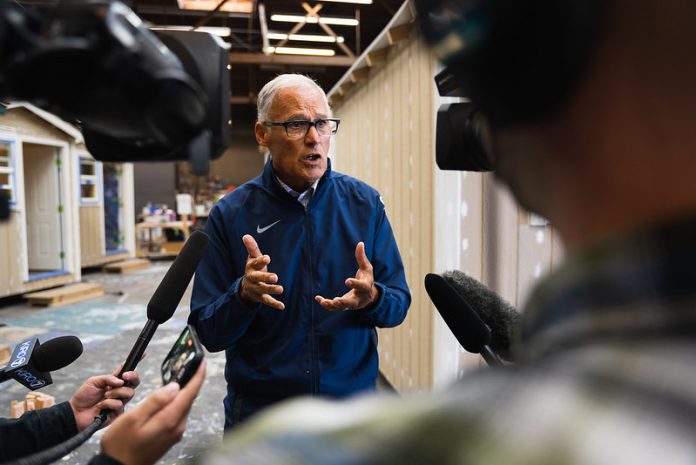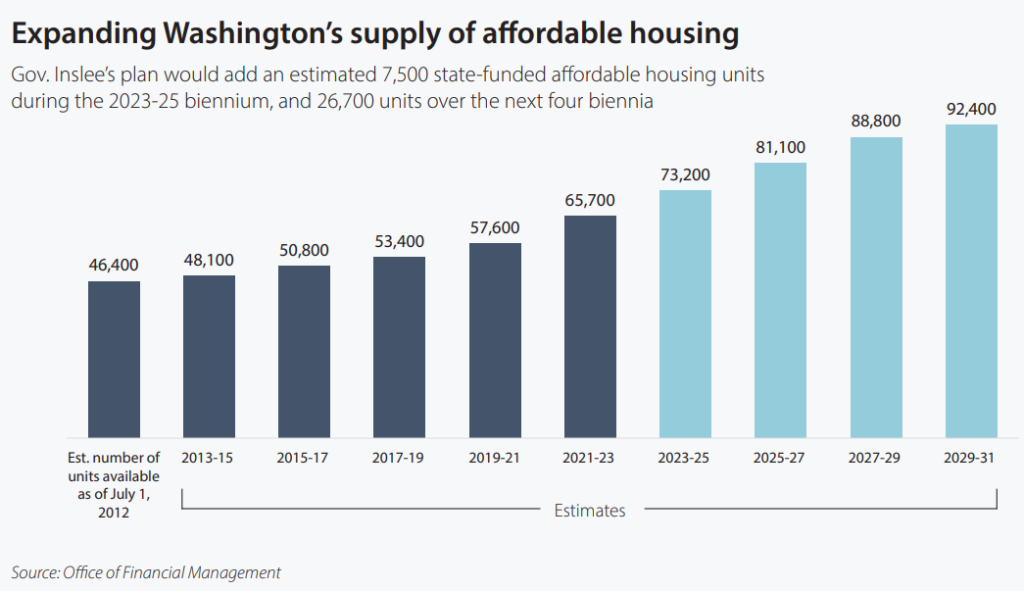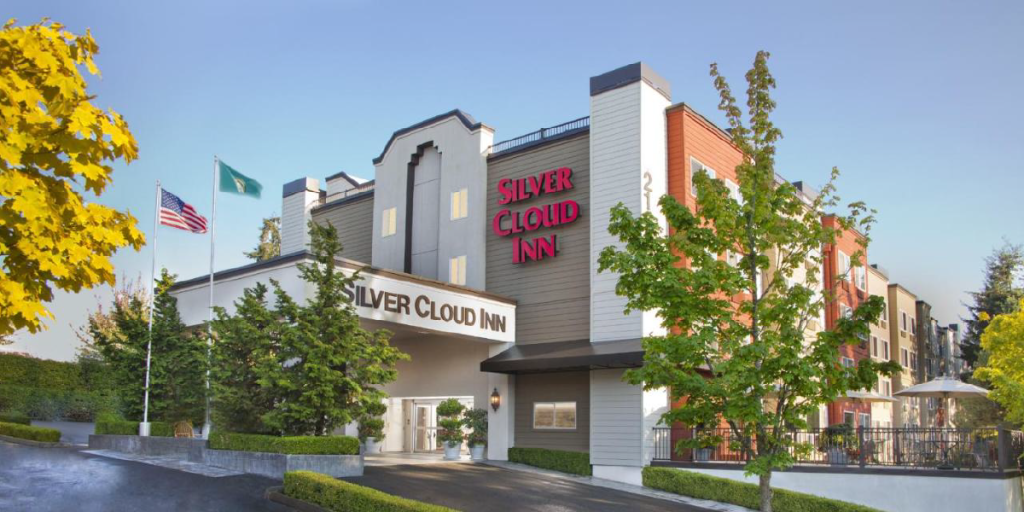
The issue of housing and services for people experiencing homelessness dominated during last week’s rollout of Governor Jay Inslee’s proposed biennial budget, which will be taken up by state lawmakers as part of the upcoming legislative session. While the $70 billion budget includes policy and spending priorities across a broad array of categories, it was clear that housing is at top-of-mind for the governor as he heads toward the end of his third term in Olympia.
Inslee directly connected the increase in the number of people living unsheltered across Washington to a growing shortfall in the number of homes being constructed to meet demand. While the governor made clear that while his budget proposes significant financial resources to tackle the crisis, he also viewed changes to the state’s zoning and permitting structures as critical to solving the problem as well.
“Homelessness is a housing crisis, that’s the first thing I want to say about it,” Inslee told reporters as he announced his budget proposal. “Homelessness is a housing deficit. We do not have enough housing for the people in the state of Washington. In the last decade, we’ve grown about a million people in the state of Washington, but we’ve only grown about 315,000 housing units. We cannot fix homelessness unless we build more housing.”
Relying entirely on the private market wasn’t viable on its own, Inslee noted. Washington will need over one million units of housing over the next two decades, according to the governor’s office, with around half of those homes affordable to households earning less than half of the median income for their area. Most market-rate development is geared toward higher-income levels given the high cost of land and construction many areas of the state.
“We need to up our game when it comes to scale on these issues. We need to increase our efforts dramatically. Not just incrementally but dramatically. We’re not going to solve the problem of over 20,000 people homeless unless we build and unless we build quickly.”

$4 billion for housing over the next six years
At the heart of the Governor’s budget is a proposal to raise the limit on the state’s ability to issue bonds, which would allow the state to invest $4 billion in a broad number of spending priorities related to housing and homelessness services over the next three biennium budgets. Raising the debt limit this way needs both approval from the legislature and the signoff of a majority of voters at a statewide election next year. But it avoids a tax increase in the short term, and allows the state to continue ramping up the production of subsidized housing, building on a big boost in the state’s capital budget earlier this year as well.
According to the Governor’s office, 7,500 units of affordable housing would be funded by just the amount allocated for 2023-2025, with that amount expected to more than triple over six years.

Here’s the breakdown of the proposed spending for the 2023-2025 biennium.
- Multi-family rental housing: $440 million
- Permanent supportive housing: $100 million
- Homeownership opportunities: $75 million
- Housing for people with developmental disabilities: $50 million
- Housing affordability preservation: $25 million
- Acquisition and preservation of mobile homes: $8 million
Also included is $270 million to help accelerate the creation of affordable housing, $37.2 million to expedite permitting and clean up contaminated sites that could see affordable housing, and $21.4 million to help cities plan for additional growth. That’s on top of $296.8 million going to maintain current homelessness services, including 2,000 existing shelter beds, that the governor’s office says would otherwise be lost. That’s a lot of money for legislators to leave intact as they barter over additional spending priorities — the governor’s budget doesn’t include a lot of new funding for schools, for example.

Concerted push for statewide zoning changes
Along with the increased funding proposed in Inslee’s budget, the Governor was clear that he also views the state’s current land use laws as a serious barrier on making progress on housing and homelessness.
“We also need land to build on” in addition to funding, the Governor said. “Unfortunately we have some restrictions on land use in our state that makes it impossible to actually build housing in many of our urban areas. So we will be asking the legislature to free up some additional land to allow multifamily housing particularly close to transit corridors.”
Democrats in the state legislature appear ready to back the Governor up, with bills pre-filed so far that would streamline local design review and incentivize homeowners to rent accessory dwelling units (ADUs) to low income households. But so far we haven’t seen a 2023 follow-up to HB 1782, spearheaded by Rep. Jessica Bateman (D-Olympia), that would force cities and towns across the state to allow a slightly more dense baseline for residential areas, such as fourplexes or sixplexes, rather than reserving them for only single-family homes. While not yet pre-filed, lawmakers and housing advocates have pledged a HB 1782 successor is in the works. (Watch the video of The Urbanist’s chat with Futurewise, who is heavily involved on the campaign, for more details.)
Since the end of the legislative session, Inslee has signaled he would support a bill making that proposal more palatable by letting cities decide which areas of their cities to upzone. Such a proposal that has the potential to continue concentrating housing along high-traffic arterial streets. One bill introduced along with HB 1782 last session was HB 2020, which barred any density limits imposed within one mile of a light rail station or major transit hub. That bill never even reached the House floor.
After so many housing-related bills failed to meet procedural deadlines during the 2022 session, Democrats in the legislature have reorganized the makeup of their committees to prioritize the issue. Both chambers will have new, standalone committees devoted to housing. Rep. Gerry Pollet (D-Northeast Seattle), former chair of the Housing & Local Government committee, has been replaced by Rep. Strom Peterson (D-Lynnwood), who called himself a strong supporter of HB 1782 earlier this year, and cited housing as his top priority for the 2023 session. Pollet rewrote much of Bateman’s bill when it came though his committee, saying it was necessary to gain needed support, but the bill subsequently failed to come to a floor vote, suggesting dissatisfaction with his changes.
On the Senate side, the Housing committee will be chaired by Patty Kuderer, one of the most pro-housing Senators in the chamber.
“Let’s see densification, large multi-unit developments near mass transit centers,” Senator Kuderer told KUOW earlier this year. “Let’s eliminate exclusionary zoning to allow for the development of accessory dwelling units and detached accessory dwelling units.”
Inslee was clear that passing even the entirety of his ambitious housing budget but not seeing changes to the state’s land use framework then it would fall short.
“It would be a shame to finance four billion dollars and then not have a place to build the houses…and that’s the situation we could be in if we don’t free up, again, some of the artificial restrictions on housing that we currently have,” he said.
It’s a tall order for lawmakers, but one Washington needs them to fulfill.
Ryan Packer has been writing for The Urbanist since 2015, and currently reports full-time as Contributing Editor. Their beats are transportation, land use, public space, traffic safety, and obscure community meetings. Packer has also reported for other regional outlets including BikePortland, Seattle Met, and PubliCola. They live in the Capitol Hill neighborhood of Seattle.

